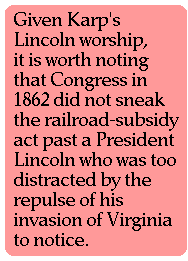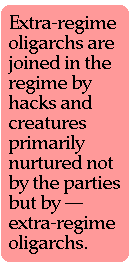"Will the real oligarchs please stand up," by
Nicholas Strakon, part six.
www.thornwalker.com/ditch/indispensable_06.htm
Reprint
rights
Our Walter Karp table
of contents
TOC for Strakon's article
Fascist circles
Unquestionably Karp is correct when he writes: "The
most important single fact about monopoly is that it
depends absolutely on massive government support and
protection." (p. 180) But he goes further. From that
proposition he derives an argument that believers in an
extra-regime ruling class, such as myself, are engaging
in circular reasoning:
They argue that the political privileges
granted to the future monopolists were extracted by the
future monopolists, who apparently used their economic
power over politicians to gain the privileges that brought
them the very wealth that gives them their economic
power. This is tantamount to believing that effects
create their own causes, that the newborn baby
compelled its parents to conceive it. (p.
191)
Continuing, he offers a seemingly archetypal example
from the early days of state capitalism:
It is tantamount to believing that when
Congress put a Maecenean fortune into the hands of
Leland Stanford, Collis P. Huntington, Charles Crocker
and Mark Hopkins by authorizing them to build the
Southern Pacific Railway, three California shopkeepers
and an obscure lawyer controlled the Congress of the
United States. (p. 191)
 In the discussion that follows, I rely on Dee Brown's well-regarded Hear That Lonesome Whistle Blow:
Railroads in the West. [16] I must make two minor points
just to clear away the underbrush. First, the road in
question is the Central Pacific, not the Southern Pacific.
Second, given Karp's Lincoln worship, it is worth noting
that Congress in 1862 did not sneak the railroad-subsidy
act past a President Lincoln who was too distracted by
the repulse of his invasion of Virginia to notice. Instead,
a government-subsidized transcontinental railroad had
long been a key plank of the Republican/Whig program; I
can find no evidence that Lincoln hesitated one second in
signing the bill when it hit his desk on July 1, 1862.
In the discussion that follows, I rely on Dee Brown's well-regarded Hear That Lonesome Whistle Blow:
Railroads in the West. [16] I must make two minor points
just to clear away the underbrush. First, the road in
question is the Central Pacific, not the Southern Pacific.
Second, given Karp's Lincoln worship, it is worth noting
that Congress in 1862 did not sneak the railroad-subsidy
act past a President Lincoln who was too distracted by
the repulse of his invasion of Virginia to notice. Instead,
a government-subsidized transcontinental railroad had
long been a key plank of the Republican/Whig program; I
can find no evidence that Lincoln hesitated one second in
signing the bill when it hit his desk on July 1, 1862.
Now to those lucky nobodies Stanford, Huntington,
Crocker, and Hopkins. Crocker does appear, from Brown's
account, to have been a comparative munchkin: he owned
a dry-goods store. (Perhaps he was just fortunate in his
choice of friends.) But Huntington and Hopkins "had
started a miners' supply store in a small tent in
Sacramento and had built it into the largest hardware
enterprise on the Pacific Coast." (Brown, pp. 44-45) And
what was the nobody Stanford doing in 1861, in addition
to incorporating the Central Pacific? Well, he was getting
himself elected Republican governor of California!
— which one would never guess from Karp's
account. (Brown, p. 45)
A writer willing to abruptly shift his ground to salvage
an argument (unlike the honorable Karp) might reply,
Very well, Stanford wasn't a nobody: he was a party
oligarch, using his power to feather his own nest.
Brown's book is populated with many such oligarchs
— notably, Black Republican congressional leader
and iron manufacturer Thaddeus Stevens, who was one of
many lawmakers showered with stock and land titles by
railroad promoters and who inserted into the 1862
railroad act a provision that only American iron be used
in construction. (Brown, pp. 46, 48)
 What I see in all this — and in the subsequent 130
years of corporate statism — is different from
what Karp sees. In general, I don't see nobodies
whimsically being made into tycoons by the party
oligarchs. I see wealthy and influential men becoming
super-wealthy and super-influential through the
employment of the political means. In fact, many
members of the regime who have worked to award
state-capitalist privileges — from Stevens in the 1860s
to Robert Kerr a century later — were the direct
beneficiaries of those very privileges, in their
extra-regime roles as big-businessmen. Such men, in my view,
are true oligarchs, but their political parties are not the
true base of their power. After all, who is going to run
for office in the first place but someone who can afford
it personally or whose sponsors can afford it?
Extra-regime oligarchs, in my view, are joined in the regime by
hacks and creatures primarily nurtured not by the
parties but by — extra-regime oligarchs.
What I see in all this — and in the subsequent 130
years of corporate statism — is different from
what Karp sees. In general, I don't see nobodies
whimsically being made into tycoons by the party
oligarchs. I see wealthy and influential men becoming
super-wealthy and super-influential through the
employment of the political means. In fact, many
members of the regime who have worked to award
state-capitalist privileges — from Stevens in the 1860s
to Robert Kerr a century later — were the direct
beneficiaries of those very privileges, in their
extra-regime roles as big-businessmen. Such men, in my view,
are true oligarchs, but their political parties are not the
true base of their power. After all, who is going to run
for office in the first place but someone who can afford
it personally or whose sponsors can afford it?
Extra-regime oligarchs, in my view, are joined in the regime by
hacks and creatures primarily nurtured not by the
parties but by — extra-regime oligarchs.
Ronn Neff's development of this theme in a private letter
to me is so insightful that I cannot resist quoting it in
full:
Karp is making the mistake of concentrating
on what is seen and ignoring what is not seen. What is not
seen are the bought politicans who lost elections or who
didn't have the mettle to get any power in Congress. He
doesn't see the wealthy backers of wrong horses —
or the would-be benefactors of wealthy figures. Try to
imagine if the great contractors Brown and Root had
misjudged Lyndon Johnson, and he had been unable to get
them their crucial Navy contracts. They would never
have become super-wealthy. And what if Johnson had
never had their backing? He would never have been able
to do anyone favors.
In other words, both power and wealth are achieved
incrementally. And one can move back and forth between
them, converting, when necessary, one into the other.
Karp might just as well claim, "It is nonsense to argue
that the wealthy get wealthier. Where did the initial
wealth come from?" Apparently, no one gets wealthier.
They are just wealthy. In reality, the wealthy seek out
avenues and opportunities for influence, just as they seek
out investment opportunities. Neither is a sure
thing.
Readers who wish to pursue this further must read
Domhoff's chapter 4, "The Candidate-Selection Process,"
especially his survey of the professional background and
ambitions of the typical officeholder on the state or
national level. [17]
To the
next part: "The wielding"
Posted June 8, 2002
Posted in 2002 by WTM
Enterprises.
Notice to visitors who
came
straight to this document from off site: You are deep in
The Last Ditch. You should
check out our home page and table of
contents.
 In the discussion that follows, I rely on Dee Brown's well-regarded Hear That Lonesome Whistle Blow:
Railroads in the West. [16] I must make two minor points
just to clear away the underbrush. First, the road in
question is the Central Pacific, not the Southern Pacific.
Second, given Karp's Lincoln worship, it is worth noting
that Congress in 1862 did not sneak the railroad-subsidy
act past a President Lincoln who was too distracted by
the repulse of his invasion of Virginia to notice. Instead,
a government-subsidized transcontinental railroad had
long been a key plank of the Republican/Whig program; I
can find no evidence that Lincoln hesitated one second in
signing the bill when it hit his desk on July 1, 1862.
In the discussion that follows, I rely on Dee Brown's well-regarded Hear That Lonesome Whistle Blow:
Railroads in the West. [16] I must make two minor points
just to clear away the underbrush. First, the road in
question is the Central Pacific, not the Southern Pacific.
Second, given Karp's Lincoln worship, it is worth noting
that Congress in 1862 did not sneak the railroad-subsidy
act past a President Lincoln who was too distracted by
the repulse of his invasion of Virginia to notice. Instead,
a government-subsidized transcontinental railroad had
long been a key plank of the Republican/Whig program; I
can find no evidence that Lincoln hesitated one second in
signing the bill when it hit his desk on July 1, 1862. What I see in all this — and in the subsequent 130
years of corporate statism — is different from
what Karp sees. In general, I don't see nobodies
whimsically being made into tycoons by the party
oligarchs. I see wealthy and influential men becoming
super-wealthy and super-influential through the
employment of the political means. In fact, many
members of the regime who have worked to award
state-capitalist privileges — from Stevens in the 1860s
to Robert Kerr a century later — were the direct
beneficiaries of those very privileges, in their
extra-regime roles as big-businessmen. Such men, in my view,
are true oligarchs, but their political parties are not the
true base of their power. After all, who is going to run
for office in the first place but someone who can afford
it personally or whose sponsors can afford it?
Extra-regime oligarchs, in my view, are joined in the regime by
hacks and creatures primarily nurtured not by the
parties but by — extra-regime oligarchs.
What I see in all this — and in the subsequent 130
years of corporate statism — is different from
what Karp sees. In general, I don't see nobodies
whimsically being made into tycoons by the party
oligarchs. I see wealthy and influential men becoming
super-wealthy and super-influential through the
employment of the political means. In fact, many
members of the regime who have worked to award
state-capitalist privileges — from Stevens in the 1860s
to Robert Kerr a century later — were the direct
beneficiaries of those very privileges, in their
extra-regime roles as big-businessmen. Such men, in my view,
are true oligarchs, but their political parties are not the
true base of their power. After all, who is going to run
for office in the first place but someone who can afford
it personally or whose sponsors can afford it?
Extra-regime oligarchs, in my view, are joined in the regime by
hacks and creatures primarily nurtured not by the
parties but by — extra-regime oligarchs.